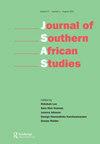Building Angola: A Political Economy of Infrastructure Contractors in Post-War Angola
IF 0.7
4区 社会学
Q2 AREA STUDIES
引用次数: 1
Abstract
Following the end of the civil war in 2002, Angola entered a period of political stability and economic growth that was sustained until the oil-price crisis hit the economy in 2015. During this period a vast reconstruction plan of economic infrastructure was implemented. This process induced a series of changes that shaped the construction industry in the country, especially the rise of Angolan contractors as a by-product of the primarily externally funded reconstruction effort. This article aims to understand the political economy of infrastructure building in Angola’s post-war reconstruction boom and the post-2015 crisis. We focus on the nature and dynamics of the emerging infrastructure market segmentation that led to the coexistence of Angolan, Chinese and other foreign contractors, when a part of oil rents was reinvested in infrastructure development, thereby generating a rapid development of the construction sector and its ancillary economic activities. The article explains the origins of segmentation among infrastructure contractors and the central role of oil-backed finance, particularly from China, during the boom and the crisis. It demonstrates the political imperatives of fast delivery of infrastructure assets for the maintenance of the dominant political settlement and the distribution of organisational power in Angola, which led to the rise of a well-organised element of state-linked Angolan capital in this lucrative sector. These experiences reflect the centrality of market segmentation and state–business relations in the evolution of the infrastructure sector in Angola, and the implications for the rise and consolidation of domestic capitalist interests.建设安哥拉:战后安哥拉基础设施承包商的政治经济学
2002年内战结束后,安哥拉进入了一个政治稳定和经济增长期,一直持续到2015年油价危机冲击经济。在此期间,实施了一项大规模的经济基础设施重建计划。这一过程引发了一系列影响该国建筑业的变化,尤其是安哥拉承包商的崛起,这是主要由外部资助的重建工作的副产品。本文旨在了解安哥拉战后重建热潮和2015年后危机中基础设施建设的政治经济学。我们关注的是新兴基础设施市场细分的性质和动态,这导致了安哥拉、中国和其他外国承包商的共存,当时部分石油租金被重新投资于基础设施开发,从而促进了建筑业及其附属经济活动的快速发展。这篇文章解释了基础设施承包商细分的起源,以及在繁荣和危机期间,石油支持的金融,特别是来自中国的金融的核心作用。它表明了快速交付基础设施资产的政治必要性,以维持安哥拉占主导地位的政治解决方案和组织权力的分配,这导致了与国家相关的安哥拉资本在这一利润丰厚的行业中的良好组织元素的兴起。这些经验反映了市场分割和国家与企业关系在安哥拉基础设施部门发展中的中心地位,以及对国内资本主义利益崛起和巩固的影响。
本文章由计算机程序翻译,如有差异,请以英文原文为准。
求助全文
约1分钟内获得全文
求助全文
来源期刊

Journal of Southern African Studies
AREA STUDIES-
CiteScore
1.40
自引率
0.00%
发文量
73
期刊介绍:
The Journal of Southern African Studies is an international publication for work of high academic quality on issues of interest and concern in the region of Southern Africa. It aims at generating fresh scholarly enquiry and rigorous exposition in the many different disciplines of the social sciences and humanities, and periodically organises and supports conferences to this end, sometimes in the region. It seeks to encourage inter-disciplinary analysis, strong comparative perspectives and research that reflects new theoretical or methodological approaches. An active advisory board and an editor based in the region demonstrate our close ties with scholars there and our commitment to promoting research in the region.
 求助内容:
求助内容: 应助结果提醒方式:
应助结果提醒方式:


